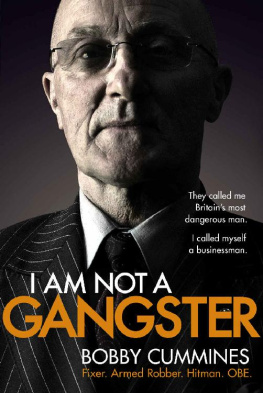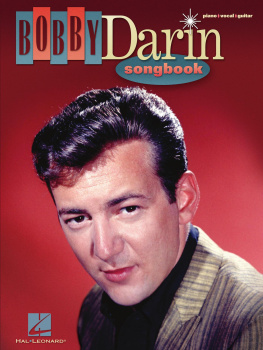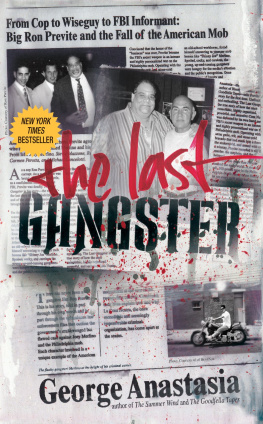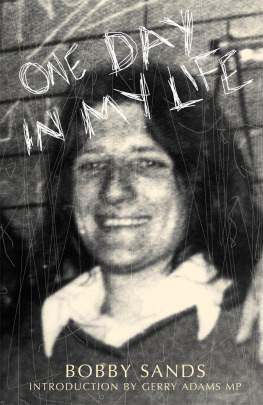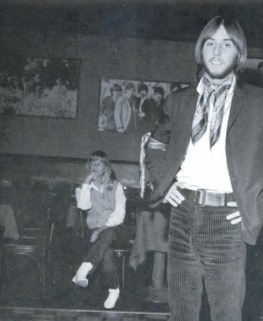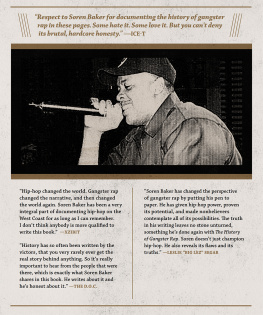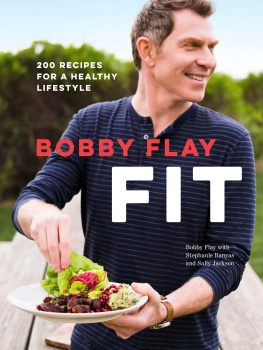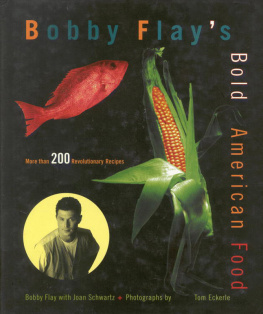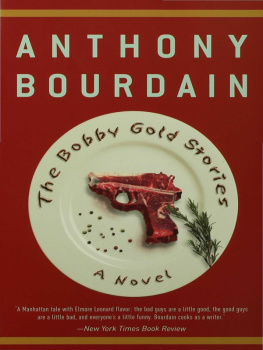Bobby Cummines - I Am Not A Gangster
Here you can read online Bobby Cummines - I Am Not A Gangster full text of the book (entire story) in english for free. Download pdf and epub, get meaning, cover and reviews about this ebook. year: 2015, publisher: Ebury Press, genre: Non-fiction / History. Description of the work, (preface) as well as reviews are available. Best literature library LitArk.com created for fans of good reading and offers a wide selection of genres:
Romance novel
Science fiction
Adventure
Detective
Science
History
Home and family
Prose
Art
Politics
Computer
Non-fiction
Religion
Business
Children
Humor
Choose a favorite category and find really read worthwhile books. Enjoy immersion in the world of imagination, feel the emotions of the characters or learn something new for yourself, make an fascinating discovery.
- Book:I Am Not A Gangster
- Author:
- Publisher:Ebury Press
- Genre:
- Year:2015
- Rating:4 / 5
- Favourites:Add to favourites
- Your mark:
- 80
- 1
- 2
- 3
- 4
- 5
I Am Not A Gangster: summary, description and annotation
We offer to read an annotation, description, summary or preface (depends on what the author of the book "I Am Not A Gangster" wrote himself). If you haven't found the necessary information about the book — write in the comments, we will try to find it.
I Am Not A Gangster — read online for free the complete book (whole text) full work
Below is the text of the book, divided by pages. System saving the place of the last page read, allows you to conveniently read the book "I Am Not A Gangster" online for free, without having to search again every time where you left off. Put a bookmark, and you can go to the page where you finished reading at any time.
Font size:
Interval:
Bookmark:
Contents
About the Book
This is the gripping true story of how one man ruled his north London manor with an iron fist and a sawn-off shotgun called Kennedy. Its a shocking insight into a society where the rules are made by gangland leaders and if anybody dare break them, they have to deal with the consequences.
Bobby was sent to prison for the first time in 1967, aged 16, and over the next decade he established himself as a hardened criminal running protection rackets and robberies against a backdrop of all-out gang warfare, where doorstep slayings and bloody shoot-outs were common.
Eventually Bobby was sentenced to 12 years in Britains most notorious prisons, along with the Krays, the Richardsons and the Yorkshire Ripper. Inside, he was introduced to the Open University and on his release he soon got down to business again. Only this time his efforts saw him go from custody of Her Majestys Prison Service to meeting with the Queen herself...
I Am Not A Gangster is an explosive account of life in the criminal underworld by one of Britains most dangerous men, but above all its a remarkable tale of redemption with the biggest turnaround in gangland history.
About the Author
At 16, Bobby Cummines became one of the youngest people in Britain to be convicted of carrying a sawn-off shotgun. After serving 12 years in many of the UKs maximum security prisons for offences including manslaughter and bank robbery, he went on to become a founding member and chief executive of UNLOCK, a charity which helps people with criminal convictions reintegrate into society. Bobby has also since co-founded the Midas charity, to help young people from disadvantaged backgrounds.
Bobby is one of the UKs leading penal reformers and has advised ministers and judges as well as public and private sector agencies on prison and rehabilitation. Education was Bobbys liberation and his passion is talking to young people in schools and colleges, deterring them from what they might perceive as a glamorous lifestyle by highlighting the harsh realities of crime and prison. This is his first book.

DEDICATION
I dedicate this book to my wife, Ami; my daughter, Sophie; my daughter, Abigail, who was tragically taken from us; my son, Kai; and Charlie Richardson, who led me on my path to success.
I also dedicate my book to my friends who have supported me on my journey, and those who are on this journey now. I have tried to show that, even in the depths of despair, there is hope. I see this as a book of hope, and perhaps a guiding light for people who have taken the wrong path in life. I took the wrong path but, with more than a little help from my friends, and total backing from the Open University, I was diverted onto a much better route.
In the hands of the brave, anything is possible.
Bobby Cummines OBE, 2014
AUTHORS NOTE
When I go around the schools, I spread this message: In the 1960s and 1970s everyone went to college and university for free, but we robbed todays young people of the same privileges. We were all greedy bastards, looking out for ourselves and not their futures.
We moan that our kids dont respect us. Why should they? We didnt respect them. We didnt invest in their futures, and make them leave college and university with massive debts. We robbed their money boxes.
Lets make sure that they have a proper education and help them to choose the right path in life. I took a long time to find that path; lets ensure that our children dont make my mistakes.
Please accept my heartfelt thanks to everyone who has written to me and given their support over so many years. Your backing meant everything to me. Everything.
FOREWORD
by Dick Hobbs, Professor of Sociology and Director of the Essex University Centre for Criminology
I HAD HEARD about Bobby Cummines decades before I actually met him. In the 1970s any Londoner with an ear to the ground could pick up rumours of violence and skulduggery from an adjacent manor but only those in the know had any notion of the true extent of an individuals criminal clout.
Working-class London was a cluster of self-contained villages boasting their own distinct occupations, football teams and villains. Local patriotism dominated. For an East Londoner, the three other quadrants of the capital were different, dangerous and ever so slightly exotic. These zones were defined, not by class or ethnicity, but by a familiarity tinged with a sense of difference.
Every neighbourhood had its own villains; theft, robbery and a little light extortion were their crimes of choice. Although drugs were about to dominate the illegal marketplace, this was not organised crime as expressed by Hollywood or the Italian Mafia, but loose networks of criminal entrepreneurs who did not like having to get up in the morning, and would rather risk doing a ten a decade in jail than doing a nine-to-five day job.
For a non-insider to hear about villains from another part of London was most unusual. But the name Bobby Cummines wafted in and out of pub conversations, describing an almost mythical presence located somewhere in North London, and associated with unspecified, violent goings-on.
The big marquee names of Londons underworld had been buried in the prison system during the 1960s, leaving behind a police force intent on obliterating any family-based neighbourhood crime firm. These were attempting to fill the vacuums left by the Krays and the Richardsons.
This became the golden age of armed robbery. Tight-knit groups of armed bandits, some working in league with corrupt detectives, roamed the streets of London harvesting large bundles of cash from banks, building societies and security vans. And this, along with his claim on a considerable chunk of working-class North London, was why even straight-goers such as myself were hearing the name Cummines.
Many years later I went through a brief period of being asked to appear in some TV documentaries regarding organised crime. On a number of occasions, although we were filmed separately, I appeared on the same programme as a man of similar age to myself, smartly dressed, straight backed, and speaking with an unreconstructed London accent. It could only be Bobby Cummines.
He spoke of a cold, unglamorous world of instrumental violence. He didnt exaggerate, but spoke expertly of a violent and mercenary world with which he was more than familiar. However, I didnt connect this man to the voice that I was hearing at the same time on the BBC, championing the rights of ex-offenders, and who, on one memorable occasion, had hoisted the Home Secretary by his own statistical petard. It took a long time before I connected the violent dynamo of pre-gentrified 1970s Islington to this eloquent advocate of social reform.
As a reformer, Bobby has proved unusually effective, and his willingness to bypass polite liberal sensibilities, albeit with a large dollop of charm, has proved innovative, efficient and, most importantly, successful. Indeed, Bobby will avoid a talking shop like the plague; as a result, he has managed to improve the life chances of some of the UKs most excluded.
Bobby Cummines has been a very violent man. He served a long, hard time in prison, where he enhanced an already formidable reputation for violence and confrontation. He then learned the hard way about making a living in the straight world, with a criminal record hanging over him.
The story that he tells in this book, taking him from working-class London to Buckingham Palace via a solitary cell, is incredible. Be warned: not all of his ideas and opinions will fit with the sensibilities of liberal society. Bobby is a traditionalist, and an unapologetic royalist. But, before the sneering starts, look at what he has achieved, not for himself, but for those at the bottom of the heap, whom he describes as our people.
Next pageFont size:
Interval:
Bookmark:
Similar books «I Am Not A Gangster»
Look at similar books to I Am Not A Gangster. We have selected literature similar in name and meaning in the hope of providing readers with more options to find new, interesting, not yet read works.
Discussion, reviews of the book I Am Not A Gangster and just readers' own opinions. Leave your comments, write what you think about the work, its meaning or the main characters. Specify what exactly you liked and what you didn't like, and why you think so.

